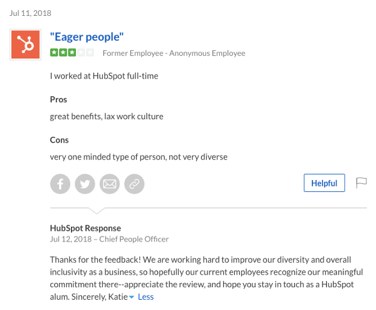Being a small-to-medium sized enterprise comes with its own exhaustive list of challenges, with talent recruitment being near the top. Smaller companies are not often able to offer the same type of benefits or perks as large corporate organizations. Furthermore, HR departments may only consist of one person or a small number of people, which means they might have much more on their plate and are not able to focus solely on recruiting job candidates. Therefore, HR teams in SMEs need to use all of the resources available to attract great talent organically.
One of the best ways to do so is by building a trustworthy and attractive brand reputation through the use of online reviews. Seven out of ten job seekers report that they spend up to an hour researching a company before they submit a job application. If they are not able to find unbiased information about how customers and employees really feel about the business, it could hurt the chances of them applying for an available position.
Using lots of reviews is also a great recruiting strategy because it increases keyword visibility when talented job seekers are searching for opportunities. But how can small businesses that may not have that many reviews (particularly from employees and previous candidates) implement this strategy?
Encourage reviews
Again, most candidates will do at least some research about a business before they apply to see how other employees and customers feel about the company. Unless they are already familiar with your brand through business connections or previous experience as a customer, they will want to figure out how your company operates. Not only do they want to know what employees think of your business, they also want to know the kinds of experiences customers are having with your company as well.
Whenever possible, make it a point to follow up with every customer after a sale to increase your library of review content. It’s often best to send out an invitation to leave a review via email, but be sure that you use an open review system that allows all customers to rate your business at any time. The key here to gathering robust and in-depth reviews is asking customers to rate different aspects of your company, rather than just leaving a general star rating.
 For example, these reviews of Trustpilot show how this can be done to provide great information to curious consumers and candidates. Every review includes an overall star-rating as well as more detailed insight into various features, such as customer support, value for the price, and functionality. The invites ask customers to get specific about the pros and cons of the product.
For example, these reviews of Trustpilot show how this can be done to provide great information to curious consumers and candidates. Every review includes an overall star-rating as well as more detailed insight into various features, such as customer support, value for the price, and functionality. The invites ask customers to get specific about the pros and cons of the product.
This offers a more transparent look into the business and how it provides value to customers, something that could be especially useful to attract top talent.
Your HR team should be using the same tactic when gathering employee reviews as well. Sites like Glassdoor and Indeed are great platforms that allow current and past workers to leave honest feedback on their employer.
Keep in mind, your employees may not necessarily think to leave a review on their own. Your HR team may want to send out invitation emails asking for honest feedback on these sites, and possibly offer some incentives once a review has been posted. And of course, please encourage honesty and don’t bribe employees to leave false or misleadingly positive reviews.
Focus on employee advocacy
Your current employees can be the best resource for top talent recruitment. First of all, a job seeker is going to be much more likely to pursue an opportunity if they’ve heard great things about the company from someone who works there. People also tend to trust the words of those similar to them more than what they read online.
Turning your employees into active brand advocates will help to support a more engaged workforce, which can lead to additional benefits like increased productivity and higher revenue rates. However, it is necessary that your employees are genuinely advocating for your brand because they have strong feelings about it – not just because you ask them to post about their job on social media.
One way to get employees onboard with genuine advocacy is by helping them understand the power of personal branding. By posting about experiences in their professional industry, your employees can build their online reputation as an expert or even an influencer. This can certainly help their professional career down the road, and can open up opportunities for collaboration, featured content with other platforms, and advancement in their profession.
Another helpful tip here is to make it easy for your employees to share great content about their jobs and your business. Creating a library of approved business content, such as articles mentioning your company or links to accurate information, can be a helpful starting point for employees who want to talk about their job but aren’t sure what to share. Also, encourage highly visual content, as this is generally more engaging on social platforms. Take lots of pictures at social business events and share them with the entire team or create business hashtags that can be used for online posts.
Know how to react to negativity
Chances are, you will receive a negative review from time-to-time, whether from a customer or a disgruntled employee. The way that you respond is extremely important; not just to the person who left the review, but to your brand’s reputation with other customers and candidates. Nearly 90% of people check out business’s responses to customer reviews, and it can influence their perception of the brand.
Of course, no matter how angry, upset, or rude the reviewer may have been, it is best to keep your response polite and professional. It is also a good idea to post a public response as well as reaching out privately to discuss a resolution. Apologize for the negative experience, and if applicable, offer an explanation for what happened. If your business is to blame, offer a genuine apology and try to remedy the situation. Then either state that you will send the customer a private message or ask for them to send an email or give your customer service department a call for further resolution.
This also applies to employee reviews. If a particular employee leaves feedback and mentions some negative experiences or complains about aspects of their job, it is important that your business responds to these comments as well.
Hubspot did a great job of this after a former employee left a less-than-stellar review about their job. Rather than argue or discount that person’s opinion, Hubspot thanked the employee for the feedback and mentioned the steps that the business was actively taking to improve.
Monitor reviews
If you’re planning on making reviews a core part of your recruiting strategy, then it is up to the HR department to stay on top of business reviews. They will need to ensure that these reviews are not just highly visible, but they are also genuine and portraying accurate information.
The best approach here to keep everything organized and easily accessible is to use a review management system that monitors brand mentions online. This will allow your team to track overall sentiment and be alerted the moment that negative or potential fraudulent feedback is posted anywhere online, including on social media platforms.
You may also want to use a tool that allows you to integrate customer and employee reviews directly on your business website for easier access and higher visibility for potential candidates to see. For instance, the software development company Informatica displays lots of review content on their careers home page, including their overall Glassdoor rating, video testimonials, and featured reviews from customers. This tactic makes it much easier for candidates to research more about the opportunities and culture of the business in one place. Plus, it shows that your business is committed to transparency – something that is extremely attractive to both job seekers and customers.
Conclusion
It is certainly tough for SMEs to organically attract great talent, especially if their brand name is not well-known or popular. Although reputation management and review strategies are typically left to PR professionals, the HR department can greatly benefit from using this type of feedback as a recruiting tool.
The key here is that you promote authenticity and transparency. Companies should never hide or remove less than perfect reviews, nor should they offer to pay for fake positive ratings.
The most talented job candidates will want to have an accurate picture of your business before they apply. By using these strategies, your business can ensure that job seekers are able to find the information they need to know before pursuing a job opportunity with your company, which can help your HR team naturally attract better talent.
